Several years ago a friend went to a private hospital for what was intended to be a simple procedure. It involved the kind of routine work that many consultants carry out as part of the public/private dual mandate that is a feature of the 'closer to Boston than Berlin' nature of the Irish health service.
But something went askew during what should have been minor surgery and the patient was hastily transferred to a public hospital where a greater range of specialist back-up was available. Somewhere in the jagged chain MRSA was contracted.
It is the super-bug, the bacterium that causes infections to various parts of the body and rampages past the efforts of commonly used antibiotics. Years later my pal continues to cope with the unpredictable, ongoing consequences of contracting MRSA.
Yesterday morning, London's Supreme Court confirmed that Brexit is the marauding MRSA that first surfaced in British politics, quickly infected the neighbouring island and is now threatening to spread to the European mainland.
The devastation happening is astonishing. For three years the mother of all parliaments has become Fawlty Towers. The Conservative Party is tearing itself apart. Labour keeps discovering new ways to define inept. An operations manager has been installed in Downing Street who has out-of-favour employees accompanied from their place of work by a police officer.
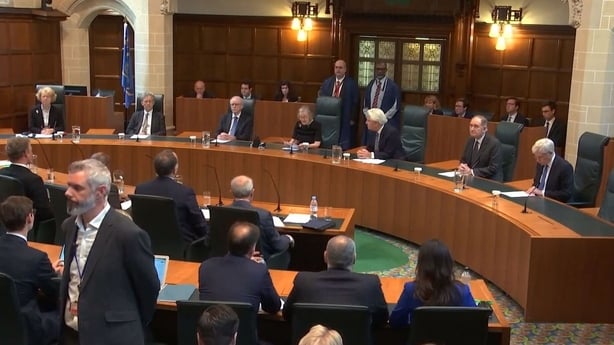
And now 11 members of the Supreme Court have unanimously decided that the Queen's chief adviser, her Prime Minister, contrived to have her approve something that is illegal.
The obsession with Brexit is not confined to the political classes. It has become compulsive viewing and reading. The draw runs deeper than those childhood longings to see what Santa would bring, or who shot JR Ewing in Dallas or would The Fugitive, Richard Kimble, be found to be an entirely innocent man.
From the BBC Radio 4 Today Programme at 6am through to BBC’s Newsnight at 10.30pm, its previews of the morning papers included, we are all but addicted to Brexit watch. Its capacity to create chaos and cause destruction seem boundless. Even Donald Trump has become a B-lister.
In this drama even the most confident, the most annoying characters get their comeuppance.
Remember Jacob Rees Mogg who seemed to have all the answers? In his first days after moving from the wings to centre stage, he was damaged goods. Lounging across the benches in the House of Commons. Then forced to make a groveling apology to the doctor he had insulted when defending his Brexit stance.
The pattern of political careers disintegrating continues. Remember Theresa May? And Liam Fox. And Michael Fallon. And the more recent crop, including the former Foreign Secretary, Jeremy Hunt. And the promise that leaving Europe would be easy and trade deals could be struck like the flick of a switch.
Even before the 2016 referendum, Northern Ireland was in fragile health. But then the Brexit virus infected its politics. The two most exposed players are Sinn Féin and the DUP.
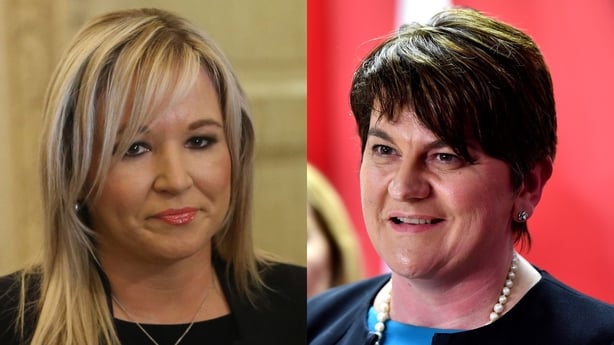
Stormont remains closed and Sinn Féin’s main activity north of the border at the moment is preparing for the expected Westminster election. It will put forward candidates on the basis that just as its current 7 MPs do, they will be abstentionists who will not vote or not speak on the floor of the House of Commons.
South of the border, Leo Varadkar has given notice of his preference to hold a May 2020 election. If there is no dramatic shift in circumstances, Mary Lou McDonald could well be leading Sinn Féin into the expected election as the party that lost two of three MPs in European Elections; shed half its representatives in local elections; continues with its abstentionist policy at Westminster and has over 20 elected members outside the door of a Stormont they played a role in closing.
Their former partners, the DUP, were riding the Brexit wave for almost two years. The party’s 10 Westminster MPs were keeping Theresa May’s minority government in power and they used their advantage to the full. But some of the consequences of that strategy are now creating a much more challenging and complex landscape.
The recently appointed Northern Ireland Secretary, Julian Smith, has a habit of speaking plain English. He said that in the UK, Northern Ireland will be the region worst affected by Brexit.
For the DUP the opportunity to take a Leave stance in a referendum campaign they expected to lose and then switch the party’s focus from Stormont to Westminster were temptations too alluring to shun. But the downsides have now emerged and the hole may well be deepening.
The Co Down farmer who featured in the DUP’s election video prior to the 2017 Westminster now fears that Northern Ireland agriculture will be decimated if the UK leaves the EU without a deal. He feels the backstop, opposed by the DUP and the Conservative government, would provide Northern Ireland with "the best of both worlds."
Theresa May sought to find a formula acceptable to the EU and the DUP that would prevent a split in her party. She failed and the DUP had a crucial role in her undoing.
The relationship between the party fronted by Arlene Foster and Nigel Dodds and the new Downing Street regime of Boris Johnson is, at best, a work in progress, on shaky foundations.
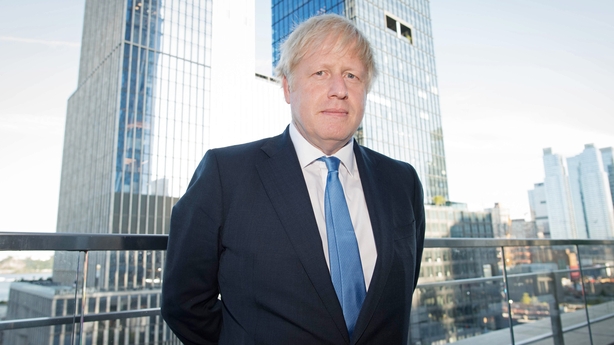
Already there have been instances when the DUP must have realised they'll need more than life belts to stay afloat in the new circumstances.
The developments happen at a relentless pace. Two weeks ago Boris Johnson came to Dublin. Last week Arlene Foster ventured south in sort of conciliatory mode.
On Monday the Labour Party brought incoherence to a new level. Yesterday morning Boris Johnson got called out for pulling a fast one on The Queen. Yesterday afternoon Nigel Dodds kept the surprises going by suggesting the UK might be in the European Union after 31 October.
Bubble, Bubble, Toil and Trouble.
Before that 31 October date there is another deadline - 21 October. Unless there is an Assembly in place by then allowing Stormont to make its own decisions, legislation already passed in Westminster on gay marriage and abortion provisions will come into effect in Northern Ireland.
For the DUP, the party that fielded its first publicly acknowledged gay candidate in recent local elections, the old arguments about gay rights are past history. The testimony of David Trimble’s daughter was further evidence that efforts to prevent change are over.
But the abortion question is causing angst for not just unionists but some nationalists as well. With no Assembly in place to intervene, Northern Ireland could find itself acquiring termination of pregnancy rights significantly more liberal than the measures instigated by referendum south of the border. The abortion issue could become many times more troublesome for the DUP that the Irish language issue proved for Sinn Féin.
Many times during the summer, small teams led by Michelle O’Neill and Arlene Foster, met and sought agreement on the small range of issues that has kept Stormont closed since January 2017.
There is a not insignificant cohort of Sinn Féin supporters who say 'we’re done with the DUP. We’ve been insulted long enough. Brexit is part of that pattern. The power-sharing experiment has run its course and it's time to concentrate on the next phase of the push for Irish unity, border poll included'.
Within the DUP camp, for two years the dominant faction has been the one that favours letting Sinn Féin stew in political impotence while the party exercises influence in Westminster.
But just like Michelle O’Neill, Arlene Foster believes in devolution. Past trends would suggest they’ll fail to find the courage to take a risk together and instead they’ll sit on the fence to see what emerges from the Westminster chaos.
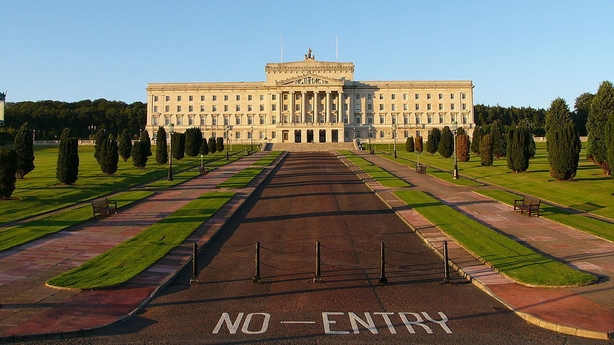
But among the British and Irish governments and all the Northern Ireland parties, there is nobody who will publicly say they’ve given up on Stormont.
Meanwhile over in Westminster, what does the future hold for Boris Johnson? John Sorohan, a former chairman of RTÉ, sometimes said one of the best nuggets of advice he picked up was 'don’t ever offer to resign. They might offer to accept it'.
If Boris resigns, at the very least his short- to medium-term career as a politician is over. Sure he will pick up large sums for columns or interviews - like the huge bundle he picked up for a speaking engagement in Dublin last year.
He could branch out into a new media career as a participant in a reality TV show - he would get good numbers on Strictly Come Dancing or Love Island. But pride (and the persuasive powers of the entourage he brought to prominence) are likely to keep him in post. His strongest card - and they are in short supply - is Jeremy Corbyn.
Dominic Cummings, the great believer in ‘noise’ and betting the house, may or may not be chastened. But it's likely that some of his next recommendations may face at least scrutiny and challenge before they are adopted and implemented.
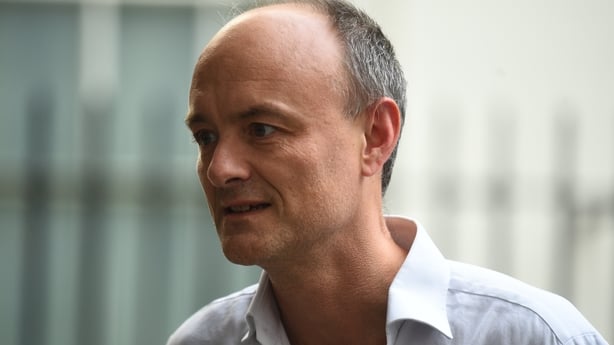
Sometimes it is hard to find a clear spot on the smoke-filled battlefield. But the harsh, troubling truths remain. No member state has left the European Union before. There is no template. No road map. And in London there is no master plan. There never was one.
The winner-take-all divorce proposals of the Brexiteers assume the departing party would and should retain full and unconditional access to the old family home.
It’s noticeable that the new Secretary of State for Northern Ireland, Julian Smith, has not once used the phrase "undemocratic backstop" that is repeated time and time again by his colleagues in the British government.
It is entirely true that unionists see the backstop as undemocratic because they don’t support it. But in Northern Ireland supporters of remaining in the European Union, and supporters of the backstop are in the majority. Getting rid of the backstop ignores their majority position.
To add another layer of facts to the puzzle, it’s worth noting that a number of key actors in the drama are soon to leave the stage. Jean Claude Juncker, the President of the European Commission and Donald Tusk, the President of the European Council, are packing their bags. The German Chancellor, Angela Merkel, has a place booked in the departure lounge.
Juncker’s replacement, Ursula von der Leyen, is a former German Defence Minister and she is bringing with her from Berlin several civil servants who are unlikely to know much about crossing points between Derry and Donegal.
The safest prediction to make is there is no sign of a compromise or a cunning plan emerging. The immediate road ahead will continue to be rocky. And fascinating.
Before he committed to a full-time career in politics, Leo Varadkar qualified as a doctor. He has indicated he favours a General Election next May.
A perceptive man with his medical background will know about the virulent nature of MRSA. He is likely to be conscious of the dangers of Fine Gael getting a touch of ‘political MRSA’, the Brexit disease. Well-meaning is no defence. Is it any wonder that Micheál Martin is keeping a safe distance from the sneezing and wheezing?






